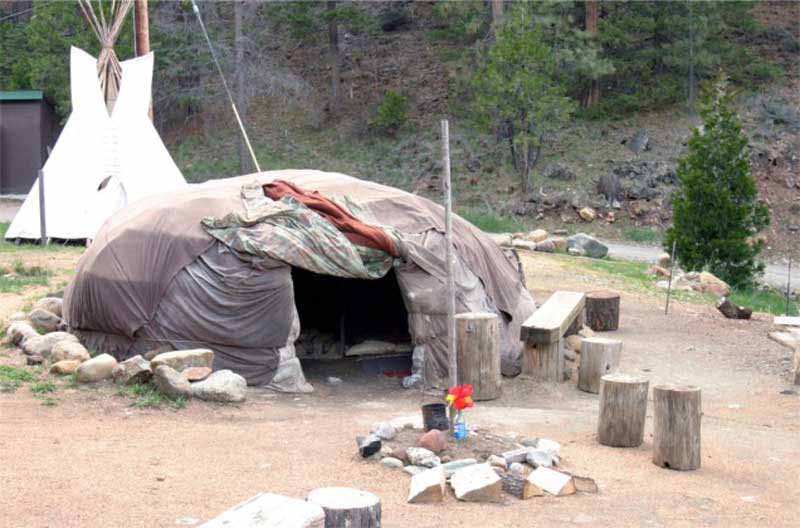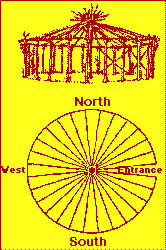Sweat Lodges
Aside from vision quests or feats of strength, bravery, and power, such as moments in battle or in the hunt, the tradition of sweat lodges is another coming-of-age ritual for both boys and girls, though more so for the former. Sweat lodges are rarely co-ed, though it is known to occur, and nudity is forbidden. Sometimes, sweat lodges are a part of longer ceremonies. Sweat lodges are described as a time to meditate, but especially, as a time for purification. Specifically, the "sweat" was created to allow men a time of purification and sacrifice, as an equivalent to women's "Moon Time," when she is menstruating (a topic we discuss in a later blog entry). (This is also why menstruating women are not allowed in sweats: they are already going through a powerful period of purification and sacrifice, and it is believed that this power can detract from the sacred ceremonies like the sweat lodges.) (Information from Seven Circles.) Common elements of sweat lodges include: near or complete darkness, importance on the placement of the lodge, the door, and the stones, care in the construction, consideration of clothing, and offerings of tobacco or herbs (tobacco either being smoked, sprinkled on the stones, or offered to the fire). (Information from Crystalinks.)The lodge is essentially a strong wood frame built out of flexible saplings in the shape of a dome, and is then covered with layers of tarps and/or blankets. Outside of the lodge, a Firekeeper (also known as a "dog soldier," in charge of protecting the ceremony and assisting the participants) tends to a fire pit which heats large rocks. When the rocks are ready, they are brought into the sweat lodge, and water is poured on them to create steam, like a sauna. (Crystalinks)
Building of a Sweat Lodge, the Customs, and the Meanings
The rocks themselves are volcanic, and are known as "Stone People" or "grandfathers," representing man's "oldest living relatives" (Seven Circles). In the book, The Round House, by Louise Erdrich, these "grandfathers" are mentioned in several passages about sweat lodges. The main character, Joe, and his friend Cappy are the "fire keepers." Joe describes:
"Farther back, nearly in the woods, the sweat-lodge dome of bent and lashed-together saplings, covered by army-surplus tarps, humidly waited, gathering mosquitoes. Cappy had already made the fire. The rocks, the grandfathers, were superheating in the middle. Our job was to keep that fire going, hand in the sacred pipes and the medicines, bring the rocks to the door on long-handled shovels, close and open the flaps. We'd also throw tobacco into our fire when someone in the lodge yelled for it, to mark some special prayer or request" (36).
Later, Joe mentions Cappy's older brother, Randall, who is leading this sweat. From his description of Randall, we know that he is a little older than the boys -- of driving age, at least -- and he is involved in the reservation and his tribe's culture by dancing or drumming at powwows. Joe continues his description of the sweat lodge:
"[Randall] was obsessive about setting everything up perfectly -- the rack for the pipes, the star quilt blanket smoothed out beside the entrance, the abalone shell for burning sage, the glass jars of powdered medicine, the bucket and dipper. He seemed to have a little measuring stick in his head for lining up these sacred items. . . But that was Randall, too, always ready to make you feel a little uncomfortable with the earnest superiority of all that he was learning from the elders, even your own elders, for your benefit. Mooshum had instructed Doe on how to set up this lodge and Doe had passed it down to Randall" (37-8).
Through Erdrich's inclusion of these customs in her book, we can see that these descriptions corroborate the traditions of the sweat lodge that we already mentioned above. We can also infer that Joe and his friend Cappy, as 13-year-olds, are not quite at the age to be participating in the coming-of-age tradition of sweat lodges, whereas Cappy's older brother Randall, who may be at least 15 or 16, is already learning the traditions and participating in the ceremonies. Still, Joe and Cappy have been given an important role, probably signifying their impending maturation and allowance to participate in that particular rite of passage.
"Farther back, nearly in the woods, the sweat-lodge dome of bent and lashed-together saplings, covered by army-surplus tarps, humidly waited, gathering mosquitoes. Cappy had already made the fire. The rocks, the grandfathers, were superheating in the middle. Our job was to keep that fire going, hand in the sacred pipes and the medicines, bring the rocks to the door on long-handled shovels, close and open the flaps. We'd also throw tobacco into our fire when someone in the lodge yelled for it, to mark some special prayer or request" (36).
Later, Joe mentions Cappy's older brother, Randall, who is leading this sweat. From his description of Randall, we know that he is a little older than the boys -- of driving age, at least -- and he is involved in the reservation and his tribe's culture by dancing or drumming at powwows. Joe continues his description of the sweat lodge:
"[Randall] was obsessive about setting everything up perfectly -- the rack for the pipes, the star quilt blanket smoothed out beside the entrance, the abalone shell for burning sage, the glass jars of powdered medicine, the bucket and dipper. He seemed to have a little measuring stick in his head for lining up these sacred items. . . But that was Randall, too, always ready to make you feel a little uncomfortable with the earnest superiority of all that he was learning from the elders, even your own elders, for your benefit. Mooshum had instructed Doe on how to set up this lodge and Doe had passed it down to Randall" (37-8).
Through Erdrich's inclusion of these customs in her book, we can see that these descriptions corroborate the traditions of the sweat lodge that we already mentioned above. We can also infer that Joe and his friend Cappy, as 13-year-olds, are not quite at the age to be participating in the coming-of-age tradition of sweat lodges, whereas Cappy's older brother Randall, who may be at least 15 or 16, is already learning the traditions and participating in the ceremonies. Still, Joe and Cappy have been given an important role, probably signifying their impending maturation and allowance to participate in that particular rite of passage.


No comments:
Post a Comment